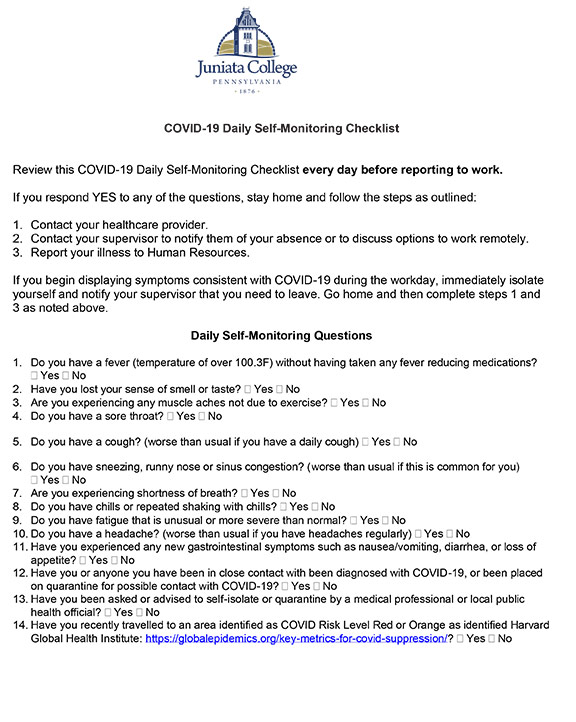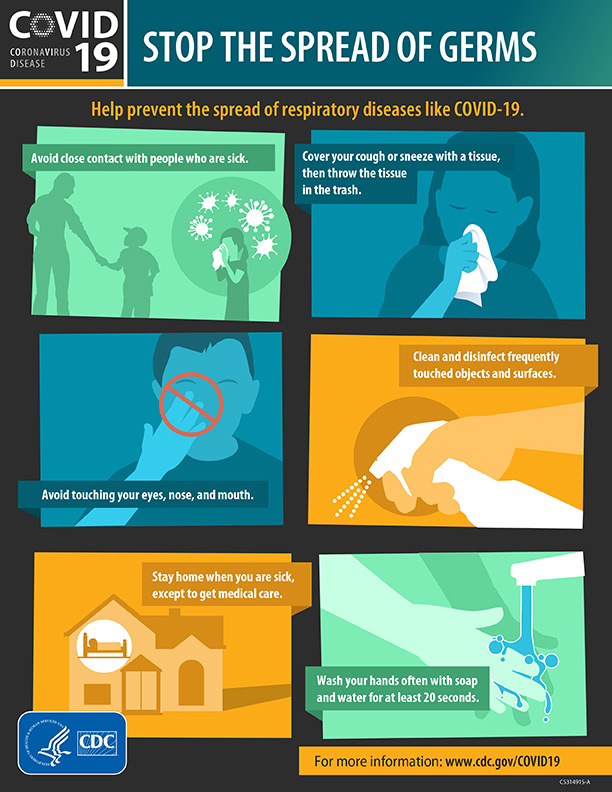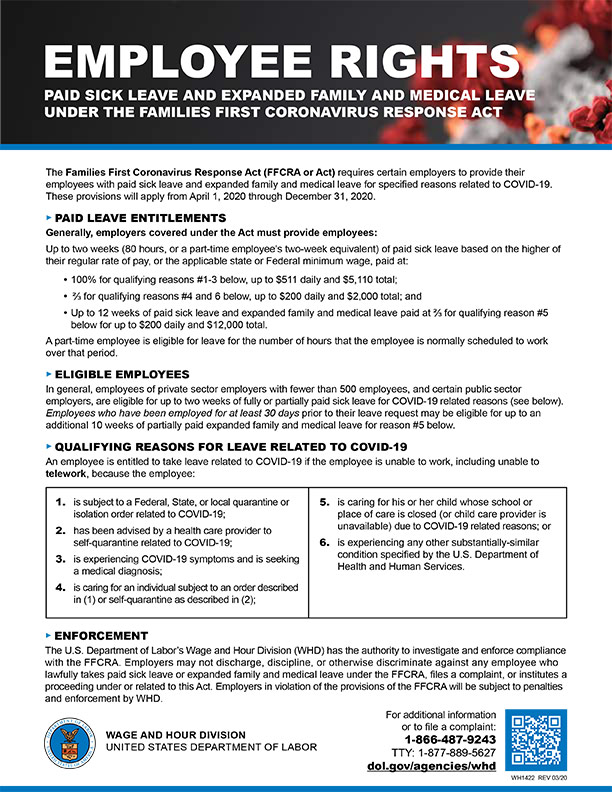Guiding Principles
Juniata’s policies and protocols for responding to the COVID-19 pandemic will be rooted in the safety of our campus, our faculty, staff and students, and the greater Huntingdon community with whom we interact. Plans will be aligned and consistent with local Department of Health as well as the State of Pennsylvania’s Process to Reopen. Federal government Considerations for Institutes of Higher Education from the Centers for Disease Control and Prevention, Pennsylvania Department of Health will be considered as we return to the workplace.
As our knowledge and understanding of the COVID-19 virus continues to evolve, our policies and plans will be updated as appropriate as more information becomes available.
Return to the Workplace
Workplace Expectations & Guidelines:
All staff are expected to fully comply with the policies, protocols and guidelines outlined in this document as part of Juniata’s Workplace Expectations and Guidelines. Failure to do so may result in corrective action.
Training:
All staff and new hires will be required to complete COVID-19 Return to Work safety training prior to the physical return to the workplace.
Testing:
As outlined in President Troha’s email communication dated May 12, 2020, Juniata has committed to testing 100% of faculty and staff prior to the beginning of the fall semester. The College has engaged Contamination Source Identification, LLC (CSI®) to provide confidential HIPAA-compliant testing, which will be provided at no cost to employees.
Temperature Screening Requirement:
Certain locations on campus may require temperature screening prior to entry.
Symptom Monitoring Requirement:
COVID-19 negative employees who have been instructed to return to the workplace must conduct symptom monitoring every day before reporting to work. You must take your temperature prior to reporting to work and be free of ANY symptoms potentially related to COVID-19 to be eligible to report to work.
Juniata will require the use of a mobile solution for daily self-monitoring of symptoms that could indicate exposure to COVID-19. The goal of daily self-monitoring through technology is to support and maintain the health and wellness of our community. Students, faculty and staff will all utilize the technology, albeit in different ways.
HR will monitor aggregate data on a daily basis to assess the overall wellness of our faculty and staff. This mobile solution does not actively track movement, or record or store information about location.
It is important to keep your cell phone number accurate and up-to-date along with your other contact information in the College information system (Self Service). You can confirm/update your cell phone number using these instructions: http://help.juniata.edu/view_article.php?article=161
Once you receive the self-monitoring link on your cell phone, you don't have to do anything else but may complete the survey. Each morning thereafter, you will receive a reminder text to complete the symptom tracker. You may also receive other text messages related to our COVID protocols. Alternatively you may use the web link to complete the survey on your PC or you may use the checkllist available here.
At this time, these symptoms include one or more of the following:
- Cough (worse than usual if you have a daily cough)
- Shortness of breath or difficulty breathing
- Fever
- Chills
- Repeated shaking with chills
- Sneezing, Runny nose or new sinus congestion (worse than usual if this is common for you)
- Muscle aches or pains (not due to exercise)
- Headache (worse than usual if you have headaches regularly)
- Sore throat
- Fatigue that is unusual or more severe than normal
- New GI symptoms
- New loss of taste or smell
OR
- A member of my household has a confirmed COVID-19 infection or I have been in close contact with someone who had a confirmed COVID-19 infection
If you feel sick, or if you are caring for a family member who is sick, stay home from work. You should follow CDC recommendations for self-isolation and wear a face mask to avoid possible virus transmission to others.
Normal call-off procedures apply in notifying your supervisor of your absence. Juniata’s requirement to provide a work excuse will be temporarily suspended, and use of sick time will not affect your ability to earn a bonus personal day.
Employees who suspect they have been exposed to COVID-19 should notify Human Resources.
You should return to work only when you or your family member has met self-isolation requirements recommended by the CDC and:
- Fever free for 72 hours (3 full days) without use of fever reducing medication
- Respiratory symptoms improved or resolved
- At least 10 days have passed since your symptoms first appeared
- If tested positive you have had 2 negative tests in a row with at least 24 hours between tests
According to the CDC, individuals with certain conditions may have a higher risk for COVID-19 infection. Those conditions may include:
- Older adults (aged 65 years and older)
- People with HIV
- Asthma (moderate-to-severe)
- Chronic lung disease
- Diabetes
- Serious heart conditions
- Chronic kidney disease being treated with dialysis
- Severe obesity
- Being immunocompromised
Faculty and staff who have concerns about being able to return should speak with their manager. Your manager will work with you and HR to discuss any available alternatives (e.g., use of vacation or sick leave, voluntary furlough leave, telecommuting, FMLA, ADA).
Possible reasons for inability to return include:
- Higher risk of infection based on CDC guidelines (you do not need to disclose specifics with your manager)
- Recent exposure to someone testing positive for COVID-19
- Displaying symptoms related to or testing positive for COVID-19
- Childcare issues related to COVID-19 school/childcare closure for children under the age of 8
COVID-19 Request for Accommodation Form
Phased Staffing:
Juniata will assess staffing based on mission-critical operations, ability to control and manage specific work environments, and necessity to access on-site resources. These decisions, once approved, will be communicated through your supervisor.
The need to reduce the number of people on campus (density) to meet social distancing requirements will continue for some time.
No unit or department should increase staffing levels beyond current needs to support critical on-site operations without approval from supervisor/Vice President. Once decisions to expand on-site staffing in certain areas have been made, staff should follow the policies and protocols detailed in this guide for returning to work on campus.
Juniata will closely monitor and assess the potential spread of the virus, as well as existing policies and procedures to mitigate it. Testing will be a critical part of assessing the impact of increased staffing. If localized outbreaks emerge, tighter restrictions and reduced staffing may need to be implemented again.
Staffing Options:
Once staff members who have been instructed to return to work on-site, there are several options departments should consider to maintain required social distancing measures and reduce population density within buildings and work spaces.
- Remote Work: Those who can work remotely to fulfill some or all of their work responsibilities may continue to do so to reduce the number of individuals on campus and the potential spread of the COVID-19 virus. These arrangements, which should be approved by the immediate supervisor, can be done in on a full or partial day/week schedule as appropriate.
- Alternating Days: In order to limit the number of individuals and interactions among those on campus, departments should schedule partial staffing on alternating days. Such schedules will help enable social distancing, especially in areas with large common workspaces.
- Staggered Reporting/Departing: The beginning and end of the workday typically bring many people together at common entry/exit points of buildings. Staggering reporting and departure times by at least 30 minutes will reduce traffic in common areas to meet social distancing requirements. (See Enter/Exit Controls for further details).
- Student Workers: All policies and guidance apply to Student Workers, as well.
Travel:
General business travel continues to be suspended. Your area Vice President must evaluate and approve in advance any essential travel on behalf of Juniata College.
Personal travel to domestically and internationally to impacted areas is highly discouraged, and you should use your best judgement regarding travel out of the area at this time.
If you have traveled, or plan to travel, to an area where there are high amounts of COVID-19 cases, you should stay at home for 14 days before returning to the workplace.
Health and Safety Guidance
Responsibilities for Individual Employees
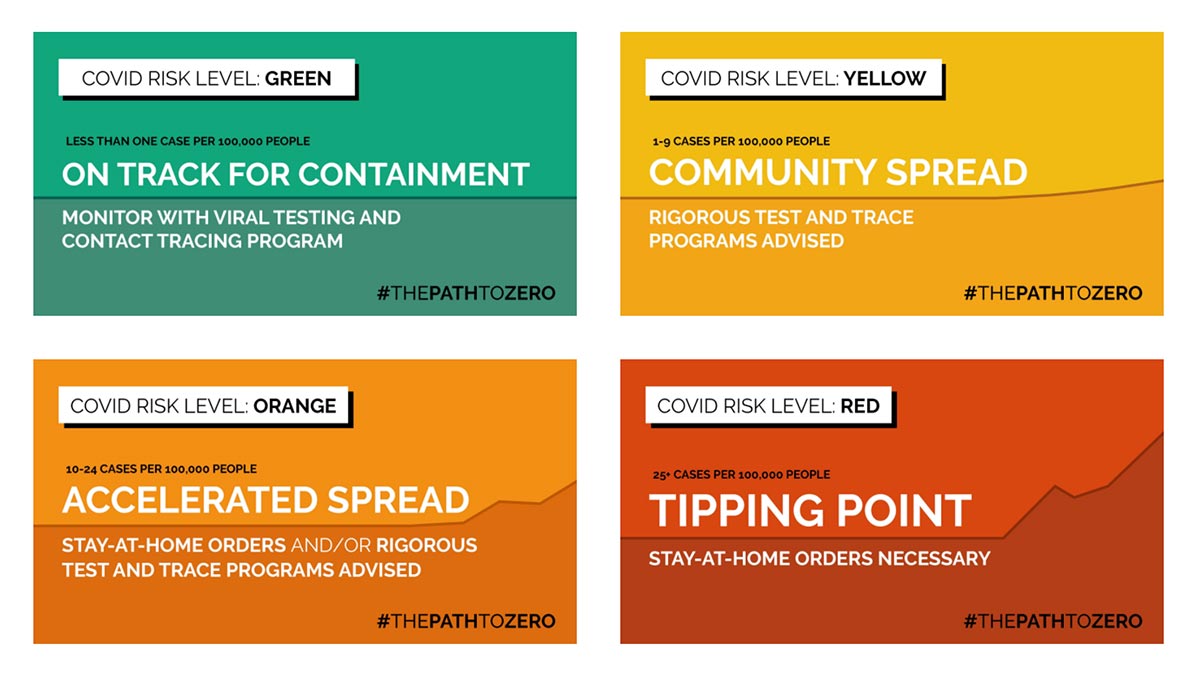
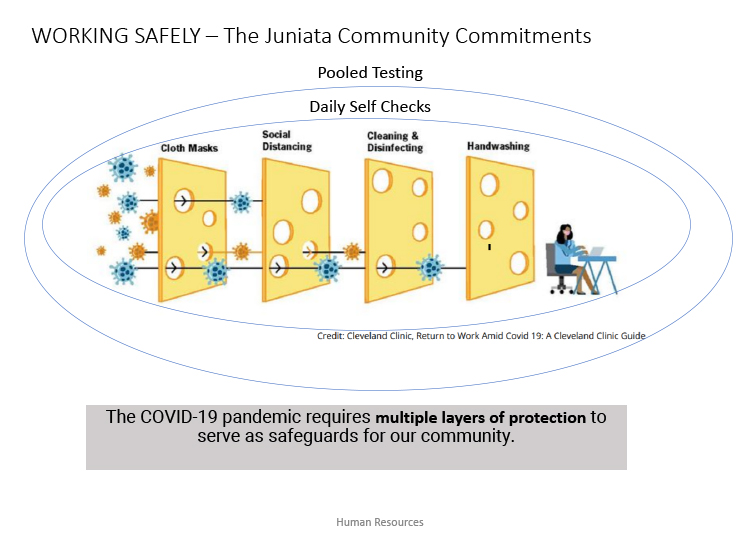
The COVID-19 pandemic requires multiple layers of protection to serve as safeguards for our community. When used together consistently, the holes (or weaknesses) in any single layer of protection may be reduced by the strengths of multiple layers of protection.
Personal Safety Practices Face Masks/Cloth Face Coverings:
Face masks or face coverings must be worn by all staff working on campus when in the presence of others and in public settings where other social distancing measures are difficult to maintain (e.g., common work spaces, meeting rooms, classrooms, etc.).
Appropriate use of face masks or coverings is critical in minimizing risks to others near you. You could spread COVID-19 to others even if you do not feel sick. The mask or cloth face covering is not a substitute for social distancing.
Disposable masks will be provided by Juniata, if needed. Disposable masks may only be worn for one day and then must be placed in the trash. You may also supply and wear a cloth face covering, which will help Juniata reduce the need to purchase additional masks, which are in short supply.
Cloth face coverings must only be worn for one day at a time and must be properly laundered before use again. Having a week supply of cloth face coverings can help reduce the need for daily laundering.
Use and care of face coverings:
For details regarding cloth face coverings, including how to create, wear and care for home-made face coverings, visit the CDC website.
Putting on the face covering/disposable mask:
- Wash hands or use hand sanitizer prior to handling the face covering/disposable mask.
- Ensure the face-covering/disposable mask fits over the nose and under the chin.
- Situate the face-covering/disposable mask properly with nose wire snug against the nose (where applicable).
- Tie straps behind the head and neck or loop around the ears.
- Throughout the process: Avoid touching the front of the face covering/disposable mask.
Taking off the face covering/disposable mask:
- Do not touch your eyes, nose, or mouth when removing the face covering/disposable mask.
- When taking off the face covering/disposable mask, loop your finger into the strap and pull the strap away from the ear, or untie the straps.
- Wash hands immediately after removing. Care, storage and laundering:
- Keep face coverings/disposable mask stored in a paper bag when not in use.
- Cloth face coverings may not be used more than one day at a time and must be washed after use. Cloth face coverings should be properly laundered with regular clothing detergent before first use, and after each shift. Cloth face coverings should be replaced immediately if soiled, damaged (e.g. ripped, punctured) or visibly contaminated.
- Disposable masks must not be used for more than one day and should be placed in the trash after your shift or if it is soiled, damaged (e.g., stretched ear loops, torn or punctured material) or visibly contaminated.
Social Distancing:
Keeping space between you and others is one of the best tools we have to avoid being exposed to the COVID-19 virus and slowing its spread. Since people can spread the virus before they know they are sick, it is important to stay away from others when possible, even if you have no symptoms. Social distancing is important for everyone, especially to help protect people who are at higher risk of getting very sick.
- Staff at work on-site must follow these social distancing practices:
- Stay at least 6 feet (about 2 arms’ length) from other people at all times
- Do not gather in groups of 10 or more
- Stay out of crowded places and avoid mass gatherings
Handwashing:
Wash your hands often with soap and water for at least 20 seconds especially after you have been in a public place, or after blowing your nose, coughing, sneezing, or touching your face. If soap and water are not readily available, use a hand sanitizer that contains at least 60% alcohol. Cover all surfaces of your hands and rub them together until they feel dry. Avoid touching your eyes, nose, and mouth, and wash your hands after touching your face.
Gloves:
Staff in high-risk areas should use gloves as part of PPE (Personal Protective Equipment), but according to the CDC, gloves are not necessary for general use and do not replace good hand hygiene. Washing your hands often is considered the best practice for common everyday tasks.
Goggles/Face Shields:
Generally, Staff do not need to wear goggles or face shields as part of regular activity on campus. Good hand hygiene and avoiding touching your face are generally sufficient for nonhealthcare environments. Environments that may be the most suitable for Face Shields should be discussed with the immediate supervisor.
Cleaning/Disinfection:
Facilities will clean office and work spaces based on CDC guidelines for disinfection, the PA Department of Public Health, and the PA Department of Education. Currently, all spaces on campus have been cleaned and disinfected, and regular and routine sanitization procedures are in place. Facilities Services has added a hydrogen peroxide disinfectant (OXIVIR TB) with a CDC-rated 1-minute kill time against COVID-19, and is providing hand sanitizer and wipes for individual use. Building occupants should also wipe down commonly used surfaces before and after use. This includes any shared-space location or equipment (e.g. copiers, printers, computers, A/V and other electrical equipment, coffee makers, desks and tables, light switches, door knobs, etc.).
Coughing/Sneezing Hygiene:
If you are in a private setting and do not have on your cloth face covering, remember to always cover your mouth and nose with a tissue when you cough or sneeze or use the inside of your elbow. Then throw used tissues in the trash. Immediately wash your hands with soap and water for at least 20 seconds. If soap and water are not readily available, clean your hands with alcohol-based hand sanitizers with greater than 60% ethanol or 70% isopropanol.
Guidance for Specific Workplace Scenarios
Shared Transportation (such as Fleet Vehicles or Rental Cars):
If you must use shared transportation, wear a mask and avoid touching surfaces with your hands. Upon disembarking, wash your hands or use alcohol-based hand sanitizers with greater than 60% ethanol or 70% isopropanol as the preferred form of hand hygiene in healthcare settings as soon as possible and before removing your mask.
Working in Office Environments:
If you work in an open environment, be sure to maintain at least 6 feet distance from co-workers. If possible have at least one workspace separating you from another co-worker. You should wear a face mask or face covering at all times while in a shared work space/room.
Departments should assess open work environments and meeting rooms to institute measures to physically separate and increase distance between employees, other coworkers, and customers, such as:
- Consider the following:
- Is face-to-face interaction necessary?
- Is it possible to require phone ahead or making appointments in advance?
- Should non-essential visitors be prohibited?
- If walk-ins are necessary, place visual cues such as floor decals, colored tape, or signs to indicate to visitors where they should stand while waiting in line. Install Plexi-glass barriers if necessary.
- Place one-way directional signage for large open work spaces with multiple through-ways to increase distance between employees moving through the space.
- Consider designating specific stairways for up or down traffic if building space allows.
If you work in an office, no more than one person should be in the same room unless the required 6 feet of distancing can be consistently maintained. If more than one person is in a room, masks/face coverings should be worn at all times. A mask or face covering is not required if you are working alone in a confined office space (does not include partitioned work areas in a large open environment).
Masks/face coverings should be worn by any staff in a reception/receiving area. Masks/face coverings should be used when inside any Juniata facility where others are present, including walking in narrow hallways where others travel and in break rooms, conference rooms and other meeting locations.
Using Restrooms:
Use of restrooms should be limited based on size to ensure at least 6 feet distance between individuals. Wash your hands thoroughly afterward to reduce the potential transmission of the virus.
Using Elevators:
Use of elevators should be limited where possible to avoid close proximity with others in a confined space. Those using elevators are required to wear a disposable face mask or face covering regardless of traveling alone or with others. You should also avoid touching the elevator buttons with your exposed hand/fingers, if possible. Wash your hands or use alcohol-based hand sanitizers with greater than 60% ethanol or 70% isopropanol as the preferred form of hand hygiene in healthcare settings upon departing the elevator.
Meetings:
Convening in groups increases the risk of viral transmission. Where feasible, meetings should be held in whole or part using the extensive range of available collaboration tools (e.g. Zoom, Microsoft Teams, telephone, etc.).
In person meetings are limited to the restrictions of local, state and federal orders and should not exceed 50 percent of a room’s capacity, assuming individuals can still maintain 6 feet of separation for social distancing requirements. Departments should remove or rearrange chairs and tables or add visual cue marks in meeting rooms to support social distancing practices between attendees. All attendees should wear a mask or face covering while sharing space in a common room.
During your time on-site, you are encouraged to communicate with your colleagues and supervisors as needed by email, instant message, telephone or other available technology rather than face-to-face. You can also use a range of available collaboration tools (e.g. Zoom, Microsoft Teams, etc.).
Meals:
Before and after eating, you should wash your hands thoroughly to reduce the potential transmission of the virus.
If dining on campus, you should wear your mask or face covering until you are ready to eat and then replace it afterward. Eating establishments must meet requirements to allow at least 6 feet of distance between each customer, including lines and seating arrangements. Individuals should not sit facing one another. Staff are encouraged to take food back to their office area or eat outside, if this is reasonable for your situation.
If you are eating in your work environment (break room, office, etc.), maintain 6 feet distance between you and others. Individuals should not sit facing one another. Only remove your mask or face covering in order to eat, then put it back on. Departments should remove or rearrange chairs and tables or add visual cue marks in employee break rooms to support social distancing practices between employees. Wipe all surfaces, including table, refrigerator handle, coffee machine, etc. after using in common areas.
Mental and Emotional Wellbeing:
Juniata’s employee assistance program through REACH is available to help employees and their families manage stress and anxiety associated with concerns related to COVID-19. You can access EAP services by calling 1-800-950-3434 (24 hours a day/7 days a week).
Compliance and Enforcement
Face/nose coverings must be worn in public settings on-campus to help limit the spread of COVID-19. This is for the safety of all employees, students, and guests of the campus. Face masks will be made available to employees and visitors. Employees may also bring their own personal face mask. If you encounter someone who is not wearing a face covering, refer them to central locations where a face mask can be provided to them at no cost. If the individual is confrontational, refuses to wear a facial covering, or repeatedly violates this campus requirement, notify your supervisor, Public Safety, or Human Resources. Remember, we are counting on everyone to comply for the safety of the entire Juniata community.
Enter/Exit Control
Departments and building coordinators should identify usable building access points and coordinate arrival and departure times of staff to reduce congestion during typical “rush hours” of the business day. Staff arrival and departures should be scheduled in 30-minute increments to reduce personal interactions at building access points, hallways, stairs/elevators, etc.
Once you have been instructed to return to the workplace, you should report to work or depart work through the designated building access and at the designated time to limit the number of people entering and exiting buildings at any one time.
All visitors must be screened at campus host, such as the Enrollment Center, Human Resources, Facilities Services, etc., as described above. As with students, faculty and staff, visitors will be given a credential that must be displayed during the visit and presented upon request. Visitors will be screened for other COVID-19 symptoms via a short questionnaire and denied access to campus if symptomatic. Visiting privileges will be suspended or curtailed until the compromised person presents without fever or symptoms. Approved visitors will be expected to wear a mask (and will be provided one if they do not have one).
Violation of these guidelines may result in the immediate revocation of building access privileges, as well as corrective action.
Signage and Posters Building occupants are expected to follow signage on traffic flow through building entrances, exits, elevator usage and similar common use areas. Signs and fliers can be downloaded for posting in building and other facilities.


